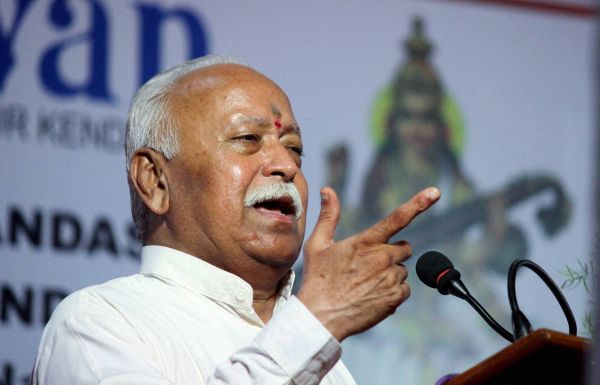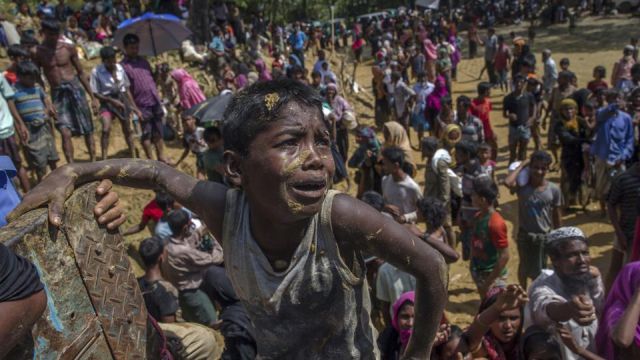
by Editor | May 25, 2021 | Opinions

Rashtriya Swayamsevak Sangh (RSS) chief Mohan Bhagwat
By Amulya Ganguli,
Rashtriya Swayamsevak Sangh (RSS) chief Mohan Bhagwat’s advice to cow vigilantes not to bother over much about judicial strictures shows a measure of annoyance with the roadblocks which the Hindutva lobby is facing in a secular polity.
The dissatisfaction may have increased in the saffron camp in view of two more Supreme Court pronouncements relating to inter-faith marriages and the fate of the Rohingyas, the hapless refugees from Myanmar who have aroused the saffron brotherhood’s ire presumably because they are Muslims.
On inter-faith marriages, the court has wanted to know in the context of a Kerala High Court judgement whether the judiciary can annul a wedding between two adults belonging to two different religions.
It is a rhetorical question which strikes at the root of a Sangh Parivar agenda which seeks to prohibit by fair means and foul any love affair or marriage between a Hindu woman and Muslim man and, by implication, between Hindus and Christians as well or any other religious community.
The Parivar’s argument is that such nuptials are no more than a ploy to lure the woman into a familial arrangement to facilitate her conversion.
Hence, the phrase “love jehad”, depicting a hapless Hindu woman who is the victim of a predatory Muslim male.
The apex court’s intervention is in a case in Kerala where the High Court has nullified the marriage of a 24-year-old woman with a Muslim while the Supreme Court had earlier ordered a National Investigation Agency (NIA) probe in the matter although the NIA is supposed to look into only acts of terror.
Irrespective of the final outcome of the Supreme Court’s examination of the case, the arguments that have already been aired such as whether the two prominent Bharatiya Janata Party (BJP) politicians who have Hindu wives can be accused of “love jehad” are bound to be awkward for the Parivar.
But what must be no less disconcerting for the latter is that the undermining of some of the programmes, which the saffron camp has pursued diligently, can raise questions about other divisive initiatives like ghar wapsi or converting Muslims to Hinduism.
This is all the more so because the saffron objections to inter-faith marriages are not unlike the often violent disapproval of the antediluvian khap panchayats to connubial ties between grown-ups belonging to different castes and communities or for being members of the same gotra.
As is known, one of the main proponents of the “love jehad” campaign was Uttar Pradesh Chief Minister Yogi Adityanath before he took office.
Of late, his ardour to keep marriages within the confines of each community has been dampened by the Centre’s unease about a rise in communal temperature lest it should affect Narendra Modi’s development agenda.
Besides, the Chief Minister has come under growing criticism because of his focus on erasing Muslim names such as that of Mughalsarai railway junction and omitting to mention the Taj Mahal in a tourist brochure rather than on saving babies in hospitals or ensuring that the police show a modicum of respect for girl students in Banaras Hindu University.
Clearly, at a time when Yogi Adityanath is proving to be as ineffective a Chief Minister as Suresh Prabhu was a Railway Minister, judicial reprimands are the last thing which the BJP wants, whether in internal affairs or in matters which have an external dimension.
If the judicial diktats on checking the gau rakshaks (cow vigilantes) and on “love jehad” have a domestic angle, the pronouncements on the Rohingyas impinge on issues of national security and international law and obligations.
Among the latter is the principle of “non-refoulement” which rules against sending back refugees to places where they are not wanted.
There is little doubt that if the government resorts to a forcible eviction of the Rohingyas, it will face considerable international opprobrium.
Considering, however, that the RSS chief has lambasted the refugees as vehemently as the government and BJP spokesmen have done, it is clear that the Parivar’s political and “cultural” wings are on the same page.
The Supreme Court’s verdict on the petition filed before it by two Rohingya refugees will be known after some time. But what the Hindutva group is likely to find disturbing is how the checks and balances built into the constitutional system can stall its efforts to take the country in a certain direction.
The only saving grace is the independence of the judiciary, especially at the higher levels, although this institution, too, experienced a troubling period during the emergency of June 1975 to March 1977, when even the principle of habeas corpus, the cornerstone of individual freedom, was suspended.
Interestingly, Justice D.Y. Chandrachud, while upholding the right to privacy in August overturned the verdict on the habeas corpus case which was delivered four decades ago by, among others, his father, Justice Y.V. Chandrachud.
In the case on gau rakshaks, love jehad and Rohingyas, the differences between the judiciary and the saffron Parivar are obvious.
For the average person, however, the judiciary continues to stand as a guardian against authoritarian and intolerant tendencies in the absence of an effective opposition.
(Amulya Ganguli is a political analyst. The views expressed are personal. He can be reached at amulyaganguli@gmail.com)
—IANS

by Editor | May 25, 2021 | World

Aung San Suu Kyi
London : An Oxford college where Myanmar’s de-facto leader Aung San Suu Kyi studied as an undergraduate has removed her portrait from public display, in a move that follows global criticism over her role in her countrys humanitarian crisis.
The governing body of St Hugh’s college, one of the University of Oxford’s constituent colleges, decided to remove the painting of the Nobel laureate from its main entrance on Thursday, days before the start of the university term and the arrival of new students, the Guardian reported late on Friday.
In 2012, Suu Kyi was celebrated with an honorary doctorate from Oxford University, and held her 67th birthday party at the college where she studied politics, philosophy and economics between 1964 and 1967.
In a statement St Hugh’s said: “The college received the gift of a new painting earlier this month which will be exhibited for a period. The painting of Aung San Suu Kyi has, meanwhile, been moved to storage.”
St Hugh’s student newsletter, The Swan, said the decision to remove the portrait was taken by the college’s governing body, which includes its fellows and principal Elish Angiolini.
The portrait, painted by the artist Chen Yanning in 1997, belonged to Suu Kyi’s husband, the Oxford academic Michael Aris, reports the Guardian.
After Aris’s death in 1999 the portrait was bequeathed to St Hugh’s, and hung near the college’s main entrance on St Margaret’s Road in north Oxford.
The Oxford council will vote next week on stripping Suu Kyi of the freedom of the city it bestowed on her in 1997, when she was being held as a political prisoner by Myanmar’s military junta.
So far Oxford University has decided not to reconsider Suu Kyi’s honorary degree. But last week the university expressed its “profound concern” over the treatment of the Rohingya, a Muslim ethnic minority.
Over 500,000 Rohingya Muslims have fled to Bangladesh after the ongoing spate of violence began on August 25 when Rohingya rebels attacked police checkposts in Rakhine state and killed 12 security personnel.
—IANS

by Editor | May 25, 2021 | Muslim World
 By Arul Louis,
By Arul Louis,
United Nations : The UN Security Council has widely condemned Myanmar’s treatment of the Rohingya Muslim minority, and also raised issues of terrorism and the attack on Hindus.
On Thursday, Secretary-General Antonio Guterres said: “In Myanmar, the situation has spiralled into the world’s fastest developing refugee emergency and a humanitarian and human rights nightmare.”
He also slammed the the Rohingya rebels for attacking police checkposts in Rakhine state killing 12 security personnel triggering the mass violence and the exodus of over 500,000 Rohingya Muslims to Bangladesh.
“The current crisis has steadily deteriorated since the August 25 attacks by the Arakan Rohingya Salvation Army (ARSA) on the Myanmar security forces… I repeat my condemnation of those attacks.”
ARSA is a separatist organisation that wants to create an Islamic state in Rakhine and is led by Ata Ullah, a Pakistan-born ethnic Rohingya who has lived in Saudi Arabia.
The Security Council heard from all its 15 members and also Myanmar and Bangladesh, but did not take any action or pass resolutions.
Guterres said that the Myanmar military should immediately stop its operations, allow humanitarian aid to reach the affected people and allow the Rohingya Muslims to return home.
US Permanent Representative Nikki Haley accused Myanmar of ethnic cleansing.
“We cannot be afraid to call the actions of the Burmese authorities what they appear to be: a brutal, sustained campaign to cleanse the country of an ethnic minority.”
Most of the other Security Council members echoed her strong condemnation of the Myanmar government and Guterres’s demands.
Russia’s Permanent Representative Vassily Nebenzia said that according to reports, the ARSA was guilty of killing civilians and had forced Hindus flee to Bangladesh.
Zambrana, a delegate of Bolivia, called for investigation of all actions that exacerbated tensions and incited violence, noting that besides the Rohingyas there were other victims including Hindus.
Bangladesh Permanent Representative Masud Bin Momen said that reports of “Muslims killing Hindus” should be seen as the Myanmar government’s failure to protect its people.
He added that allegations and counter-allegations of atrocities must be fully investigated by the Security Council.
Myanmar’s National Security Adviser U Thaung Tun alleged that a large number of Hindu villagers have been massacred and buried in mass graves.
Egypt’s Permanent Representative Amr Abdellatif Aboulatta said that backing the rights of the Rohingya Muslims did not mean supporting violence of any related groups.
“It is important to ask: What choice are we leaving to these people, other than taking up arms to defend themselves?”
U Thaung said that the root of the crisis was terrorism and not religion and “terrorism constitutes one of the most serious threats to international peace and security”.
He invited Guterres to visit Myanmar and said that diplomats and mediapersons will visit Rakhine next week.
Myanmar is ready to hold talks with Bangladesh on arranging the return of refugees, U Thaung said.
“Our stated willingness to discuss the issue of repatriation gives the lie to the assertion that there is a policy of ethnic cleansing on our part.”
(Arul Louis can be reached at arul.l@ians.in)
—IANS

by Editor | May 25, 2021 | Muslim World
 Nay Pyi Taw : Myanmar authorities will soon launch a national verification process for refugees who fled violence in Rakhine state to neighbouring Bangladesh, a minister declared on Thursday.
Nay Pyi Taw : Myanmar authorities will soon launch a national verification process for refugees who fled violence in Rakhine state to neighbouring Bangladesh, a minister declared on Thursday.
Before the move, Minister at the State Counselor’s Office U Kyaw Tint Swe will travel to Bangladesh for talks with the authorities over the process, according to Minister of Social Welfare, Relief and Resettlement U Win Myat Aye.
The verification process, based on principles to which both Myanmar and Bangladesh agreed in 1993, will be carried out at Taungpyo Latwe village for those who return by road and at Naguya village for those who come back by waterways, Xinhua news agency quoted the minister as saying.
Under the current plan, the verified refugees will be settled at Dargyizar village, he said.
In some Muslim communities in the state, their leaders are said to have decided not to join in the process.
However, State Counselor Aung San Suu Kyi urged them in her September 19 speech to respond to the process, saying that they have nothing to lose.
The Arakan Rohingya Salvation Army (ARSA) extremist terrorists attacked police checkposts in Rakhine on August 25 killing 12 security personnel. Myanmar authorities ordered a crack-down which led to over 415,000 Rohingya Muslims fleeing to Bangladesh.
Besides the national verification process, Myanmar authorities are also implementing a rehabilitation and resettlement and long-term development programmes not only for Muslims but also for Rakhines, Mro, Daing-net and Mramagyi as well as the Hindu minority who fled their villages due to extremist terrorists’ attacks, officials said.
—IANS

by Editor | May 25, 2021 | Muslim World
 Washington : Saudi King Salman has allocated $15 million (Dh 55 million) aid for Rohingya refugees fleeing persecution in Myanmar and taking refuge in neighbouring Bangladesh.
Washington : Saudi King Salman has allocated $15 million (Dh 55 million) aid for Rohingya refugees fleeing persecution in Myanmar and taking refuge in neighbouring Bangladesh.
“A specialised team from the centre will be heading to Bangladesh to assess the condition of Rohingya refugees there and find out their urgent needs and provide them with relief assistance, humanitarian help and shelter,” said Abdullah Bin Abdul Aziz Al Rabiah, General Supervisor of Riyadh-based King Salman Centre for Relief and Humanitarian Aid on Tuesday.
“As per the directive of the King, the centre has carried out a number of projects, while some others are in various phases of implementation,” he was quoted as saying by the Saudi Press Agency.
Al Rabiah made the statement following a meeting with members of the National Council on US-Arab Relations and the Committee on cooperation between US Partnerships and GCC Countries at the US House of Representatives in Washington.
The Saudi Cabinet renewed the Kingdom’s calls on the international community to take urgent action to stop the attacks and to allow the Myanmar Muslim minority their basic human rights.
The Rohingya refugees began fleeing Myanmar from August 25 when Arakan Rohingya Salvation Army (ARSA) rebels attacked police checkposts and killed 12 security personnel, triggering a military crackdown.
At least 420,000 Rohingya have since fled to Bangladesh to escape what a senior UN official called a “textbook example of ethnic cleansing”.
Myanmar has said its military operations in Rakhine were in response to the August attack and that the military was battling terrorists.
If the situation in Myanmar’s Rakhine state persists, UN agencies estimate the total number of refugees entering Bangladesh may hit one million.
—IANS





